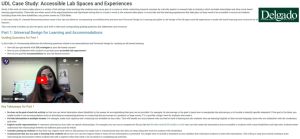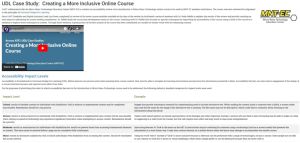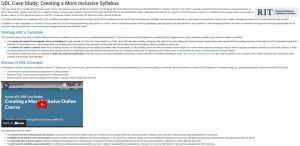AccessATE is excited to announce the publication of four new case studies from our partner, CAST. Each of these studies reflects areas of high need where the integration of accessibility best practices and the principles Universal Design for Learning (UDL) have a substantial impact in the accessibility and inclusivity of all students. Learn more about the new case studies below.

A Multimodal Approach to Medical Terminology
One of UDL’s principles is providing multiple means of representation, and is the focus of this study. This principle helped students learn complex medical terminology in a health sciences course through the use of a multisensory approach that included American Sign Language (ASL). This multimodal approach led to those students scoring 10 points above the county average, and to gaining valuable communication skills that will better enable them to meet the needs of Deaf patients and families.

Accessible Lab Spaces and Experiences
Lab experiences can pose significant challenges to students with disabilities when they’re not designed with accessibility in mind. Dr. Amanda Rosenzweig at Delgado Community College utilized her extensive experience in designing lab spaces to provide multiple options for students to engage in STEM learning. Her designs, built around UDL strategies, provide accommodations for the specific needs of students with disabilities.

Creating a More Inclusive Online Course
The Micro Nano Technology Education Center, or MNT-EC, is developing an Introduction to Micro Nano Technology course for the online platform Canvas, to be used by MNT-EC’s member institutions. This case study is built on CAST’s work with MNT-EC, wherein CAST’s Disability and Digital Inclusion Lead, Luis Perez, has been providing coaching to the lead course developer, Dr. Neda Habibi, in order to improve the accessibility of the course’s modules. This case study includes a model for prioritizing accessibility work based on impact on the students’ experience, plus tips for incorporating UDL principles, which make online courses more engaging and easier to navigate for all.

Creating a More Inclusive Syllabus
Syllabi provide students with an overview of what to expect from a given course, and as such, are opportunities to set a welcoming and inclusive learning environment, identify learning expectation, and share information that can help set all students up for success. The National Technical Institute for the Deaf (NTID) conducted a thorough review of the syllabus template used by all their instructors. Utilizing an accessible template is the first recommended best practice, as it increases the likelihood that it will result in an accessible syllabus. Once changes were made to the template, Luis Perez then provided additional UDL coaching to NTID instructors.
This article was written in partnership with Luis Perez of CAST.




 See More Feature Articles
See More Feature Articles